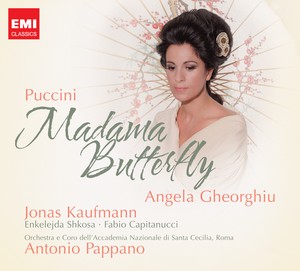|
|
|
|
|
|
|
|
| The New Zealand Herald, Apr
14, 2009 |
| William Dart |
|
|
|
Puccini - Madama Butterfly |
|
 It
is difficult to resist the power of Puccini's Madama Butterfly. Its premiere
may have been one of the operatic disasters of all time - his rivals packed
La Scala with hecklers - but even that austere critic Theodor Adorno
acknowledged the impact that childhood memories of the opera, thanks to
78rpm records, had on him. It
is difficult to resist the power of Puccini's Madama Butterfly. Its premiere
may have been one of the operatic disasters of all time - his rivals packed
La Scala with hecklers - but even that austere critic Theodor Adorno
acknowledged the impact that childhood memories of the opera, thanks to
78rpm records, had on him.
Would that Adorno had lived to hear EMI's new recording of the work,
undertaken to celebrate the composer's 150th birthday last year.
Shrewd casting has Angela Gheorghiu as Butterfly opposite Jonas Kaufmann
as her Yankee seducer, and Music's patron saint herself must be smiling down
at the heavenly performances that conductor Antonio Pappano draws from the
Orchestra and Chorus of the Accademia Nazionale di Santa Cecilia.
Madama Butterfly is more than quaint orientalism. The plight and treatment
of its heroine touches more sensitive buttons after the colonising horrors
in the Far East, culminating in the Vietnam War. It is not difficult to
reassess Puccini's love story against this backdrop, which is just what Miss
Saigon attempted in its tawdry way.
Pappano certainly approaches it all with an unflinching sense of drama. The
opening pages have a fury that, on film, could accompany a chopper raid in
'Nam; yet Butterfly's first appearance places her voice in a diaphanous wash
of women's voices and harp.
Back in 2000, Angela Gheorgiu boasted that "with the colour of my voice I
can do everything", going on to express her concerns about the stamina test
of singing this opera on stage; in the studio there are no such worries.
From the breathless ecstasies of "Ancora un passo or via" to the harrowing
acceptance of the final "Con onor muore", with huge orchestral chords
slashing about her like hara-kiri swords, could any soprano rival the
intensity of this Romanian diva?
Kaufmann has conceived Pinkerton as a ruthless cad and the German singer
is in thrilling voice, even if his characterisation does not quite depose
memories of Giuseppe di Stefano.
Smaller roles are finely sketched, with special plaudits going to to
Enkelejda Shkosa's Suzuki although the final triumph is Puccini's, thanks to
Pappano's unswervingly dramatic conception and a recording that does it
every justice. |
|
|
|
|
|
|
|
|
|
|
|
|
|
|
|
|
|
|